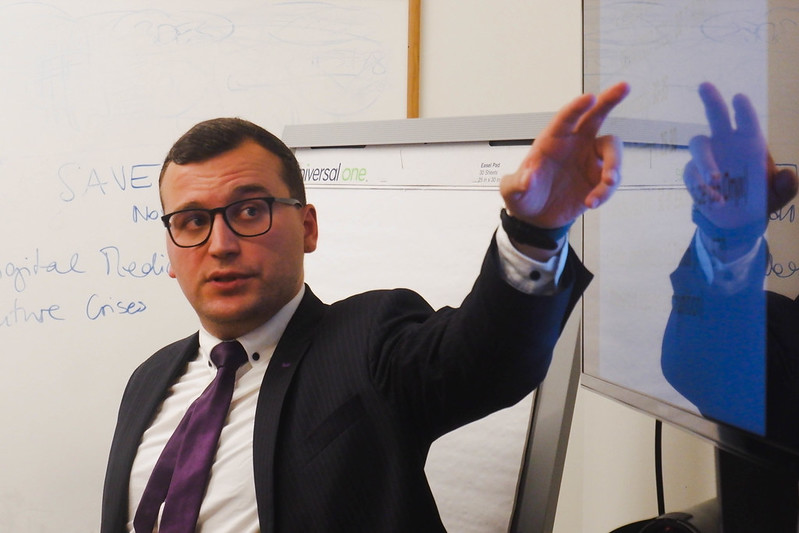
Fall 2022 Fletcher Eurasia Club Lunch Seminars, Part 2
By Vishal Manve, MALD Candidate at The Fletcher School
In the second half of the Fall 2022 semester, the Fletcher Eurasia Club hosted six lunch seminars that allowed students to engage with experts on Russian geopolitics, legal challenges, U.S. grand strategy in Eurasia, and Black Sea regional security.
The sessions were conducted by visiting scholars Oleg Shakirov, Volodymyr Dubovyk, Stanislav Stanskikh; external experts Daria Trenina and Andrei Yakovlev; Fletcher professor Abigail Linnington and former faculty member Amy Myers Jaffe; and military fellows.
In the first session, Professor Volodymyr Dubovyk, who taught a course on Black Sea Regional Security in the second half of the fall 2022 semester, discussed how outside powers could maintain the balance of power in the Black Sea region.
“For a long time, we saw the Black Sea as a region of conflict and cooperation, and later, we saw there was more conflict than cooperation…The Black Sea region was seen as a big concern in terms of soft power challenges. People were talking about human trafficking, weapons trafficking, and environmental concerns,” Professor Dubovyk said.
Dubovyk also talked about the possibility of Ukraine becoming a regional leader, saying “I think there is a chance for the regional grouping to be revived. It depends on how the war ends and if Ukraine emerges victorious, but it’s very difficult to define what we mean by victory.”
The second session featured former Fletcher professor Amy Myers Jaffe, who discussed how the war disrupted diesel and other product exports from Russia, but not crude oil. She added that Europe initially stopped buying Russian oil to avoid funding the war, which led to a temporary price increase. Jaffe also talked about how Russia had lost the gas market to China and the US forever and warned that managing an energy crisis would require rationing.
In the third session, Stanislav Stanskikh, a visiting fellow at The Fletcher School and Russian constitutional scholar in exile, discussed what is happening in Russia right now and how to deal with it from diplomatic and other points of view. Lawyer Daria Trenina also joined Stanskikh for the session.
Stanskikh analyzed Russia’s current authoritarian regime and its political repression of citizens and non-citizens alike.
“After the fall of the Soviet Union and the establishment of Russia, the West was sympathetic towards democratic transitions thirty years ago, and often turned a blind eye to human rights violations in Russia because they believed in democratic transitions in Russia and other Soviet countries. The belief was that they were on the right track.” he noted.
Oleg Shakirov, former visiting fellow at The Fletcher School, discussed cyber warfare in Ukraine, Russia, and beyond in his seminar. Shakirov emphasized that Ukraine has been a testing ground for cyber warfare since 2014, including attacks that disrupted physical systems. Shakirov also discussed the impact of cyber attacks on Ukraine’s provision of financial and government services to the public.
“The 2015-2016 attack on power grids…was among a small selection of attacks that disrupted physical systems in Western Ukraine. In Russia, there was no discussion of cyber security consequences if a war starts. Ukraine faced various attacks including viper attacks, and multiple government websites were defaced,” Shakirov said.
However, “cyber attacks did not play any major impact, and there are several potential explanations. Ukraine was ready for the Russian cyber attacks and foreign partners boosted Ukraine’s cyber defenses,” he concluded.
Professor Abigail Linnington and three military fellows from The Fletcher School led the fifth session. They addressed the U.S. approach to grand strategy with a focus on Eurasia, the definition of grand strategy as a state theory to keep itself secure, and the latest NSO documents and their significance.
The final session of the semester was led by Andrei Yakovlev, visiting scholar at the Davis Center at Harvard University and senior researcher at HSE University (Moscow), who discussed the Russian economy and domestic politics.
Overall, the seminar series provided Fletcher and Tufts students with a valuable avenue to engage with Eurasian experts and learn about the region’s critical geopolitical and security issues.

